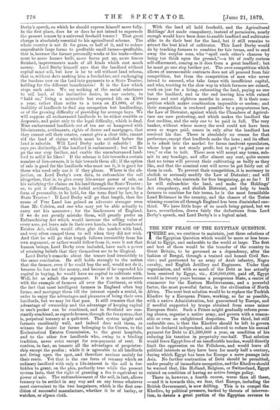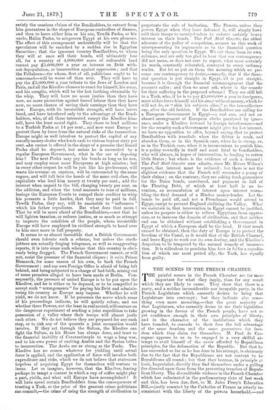THE NEW PHASE OF THE EGYPTIAN QUESTION. THERE are, we
continue to maintain, just three solutions of 1 the Egyptian Question which would be more or less bene- ficial to Egypt, and endurable to the world at large. The first and best of these would be the transfer of the country to Great Britain, to be governed as a dependency, after the fashion of Bengal, through a trained and honest Civil Ser- vice; and garrisoned by an army of Arab infantry, Negro cavalry, and English Artillery and Engineers. Under that organisation, and with so much of the Debt as has actually been received by Egypt, viz., £50,000,000, paid off, Egypt would in twenty years become a prosperous State, a centre of commerce for the Eastern Mediterranean, and a powerful factor, the most powerful factor, in the civilisation of North Africa. The next best solution would be to replace the Turkish Khedive by a European Prince, working, so far as possible, with a native Administration, but guaranteed by Europe, and if needful supported by troops obtained from some minor European State. Such a Prince might gradually reform press- ing abuses, organise a native army, and govern with a reason- able or even an enlightened despotism. The third, but still endurable one, is that the Khedive should be left to govern and be declared independent, and allowed to reduce his annual payment for Debt to £1,500,000 a year, on condition of his reducing his taxation in perpetuity one-half. That solution would leave Egypt free of an insufferable burden, would directly limit the oppression on the Fellaheen, and would leave all political interests as they have been for nearly half a century, during which Egypt has been for Europe a mere passage into Asia. No further contraction of Debt should be permitted, under penalty of immediate occupation, and the Khedive should be warned that, like Holland, Belgium, or Switzerland, Egypt existed on condition of having no active foreign policy.
There is, however, a fourth course, worse than all these, —and it is towards this, we fear, that Europe, including the British Government, is now drifting. This is to compel the Khedive, by political pressure, backed by threats of interven- tion, to devote a great portion of the Egyptian revenue to
satisfy the usurious claims of the Bondholders, to extract from him guarantees in the shape of European controllers of finance, and then to leave either him or his son, Tewfik Pasha, or his uncle, Halim Pasha, to misgovern Egypt at his own pleasure. The effect of this arrangement undoubtedly will be that the speculators will be enriched by a sudden rise in Egyptian Securities ; that the ignorant country Bondholders, to whom they will at once sell their bonds, will ultimately lose all, for a country of 4,000,000 acres of culturable land cannot pay £5,000,000 a year as interest on Debt with- out depopulation, or insurrection against oppression ; and that the Fellaheen—for whom, first of all, politicians ought to be concerned—will be worse off than ever. They will have to pay the £5,000,000 a year tribute to the Jews of London and Paris, and all the Khedive chooses to exact for himself, his army, and his seraglio, which will be the last farthing obtainable by the whip. They will have no more justice than they have now, no more protection against forced labour than they have now, no more chance of saving their earnings than they have now. Europe, with its irresistible strength, will have inter- fered, and have interfered only to the advantage of the Bond- holders, who, of all those interested except the Khedive him- self, have the least moral right. They chose to lend millions to a Turkish Pasha at 14 per cent., and now want Europe to protect them by force from the natural risks of the transaction. Europe might as well interfere to protect the capital of any rascally money-dealer who lends cash to vicious boys at sixty per cent...An excuse is offered in the shape of a promise that Ismail Pasha shall be deposed, but unless he is succeeded by a regular European Government, what is the use of deposing him ? The next Pasha may pay his bonds as long as he can, and may employ some more Europeans at high salaries ; but in every other respect he will be just like his predecessor, will waste his revenue on caprices, will be surrounded by the same rogues, and will fall into the hands of the same evil class, the capitalists who lend him money at twenty per cent., add the interest when unpaid to the bill, charging twenty per cent. on the addition, and when the total amounts to tens of millions, besiege the European Courts to compel their creditor to whip his peasants a little harder, that they may be paid in full. Tewfik Pasha, they say, will be amenable to " influences " which his father repudiates. But what does that mean ? That he will be more afraid of the Bondholders,—not that he will lighten taxation, or enforce justice, or so much as attempt to improve the condition of the people, whom irresistible Europe will have employed its civilised strength to hand over to him once more in full property.
It seems to us almost incredible that a British Government should even tolerate such a scheme, but unless the stock- jobbers are actually forging telegrams, as well as exaggerating reports, it is into some such scheme that this country is obvi- ously being dragged. The French Government cannot, or will not, resist the pressure of the financial cliques ; it suits Prince Bismarck, for some reason of his own, to back the French Government ; and our own Foreign Office is afraid of being left behind, and being subjected to a charge of bad faith, arising out of some promises alleged to have been made at Berlin. Con- sequently, the pressure of united Europe is to be put upon the Khedive, and he is either to be deposed, or to be compelled to accept such " arrangements" for paying his Debt and adminis- tering his country as Europe may impose. Whether he will yield, we do not know. If he possesses the nerve which some of his proceedings indicate, he will quietly refuse, and see whether three Powers, not the least in real accord, will venture on the dangerous experiment of sending a joint expedition to take possession of a valley where their troops will almost jostle each other. We do not believe they are prepared for any such step, or to risk any of the quarrels a joint occupation would involve. If they act through the Sultan, the Khedive can fight the Sultan, as his House has always done, and trust to the financial inability of Constantinople to wage a long war, and to his own power of exciting Arabia and the Syrian tribes to insurrection. The Arabs are as strong as the Turks. The Khedive has no reason whatever for yielding until actual force is applied, and the application of force will involve both expenditure and risks, which we do not believe that statesmen hopeless of acquiring Egypt for themselves will venture to incur. Let us imagine, however, that the Khedive, fearing perhaps to tempt a contest in which a cup of coffee might play a part, yields, and what will Europe have accomplished ? It will have saved certain Bondholders from the consequences of trusting a Turk, at the price of the greatest crime politicians can commit,—the crime of using the strength of civilisation to perpetuate the rule of barbarism. The Powers, unless they govern Egypt when they have defeated it, will simply have sold their troops to money-lenders to enforce unfairly heavy interest on their bonds. The Pall Mall Gazette, the ablest advocate of the policy of compulsion, accuses us this week of misrepresenting its arguments as to the financial question being the only question in Egypt. We cut them from its own columns, and are only too glad to hear that our contemporary did not mean, or does not care to repeat, what most certainly its words, constantly reiterated, conveyed to every ordinary reader. But let us put on them the meaning which we pre- sume our contemporary to desire,—namely, that if the finan- cial question is put straight in Egypt, all is put straight, because it is through the financial mismanagement that the peasants suffer ; and then we must ask, where is the remedy for their suffering in the proposed scheme ? They are still left to a Turk, who, if he is to pay £5,000,000 a year to foreigners, must either leave himself and his army without money, which he will not do, or " skin his subjects alive," as the tax-collectors say, after the old fashion. If the Bondholders are calling for a European Government in Egypt—a real one, and not an absurd arrangement of European clerks paralysed by ignor- ance, under a Khedive fettered by foreign interference—and for the security such a Government might give for low interest, we have no opposition to offer, beyond saying that to protect Bondholders with ironclads when the debtor is weak, and abandon them, as in the Spanish case, when he is strong, or, as in the Turkish case, when it is inconvenient to punish him, is a policy cowardly in itself and most fatal to bondholders, who will always, in hopes of intervention, be lending to rotten little States ; but where is the evidence of such a demand ? The Pall Mall Gazette now admits, since Mr. Rivers Wilson's report, that interest must be reduced ; but there is not the slightest evidence that the French will surrender a penny of their claims ; on the contrary, they are asking fresh guarantees for the Daira bonds, unreduced, and payment in full of the Floating Debt, of which at least half is an in- vention, an accumulation of interest upon interest resem- bling the final demand of a Hindoo money-lender. Let the bonds be paid off, and not a Frenchman would attend to Egypt, except to prevent England civilising the Valley. What we maintain is, that intervention in Egypt cannot be justified, unless its purpose is either to relieve Egyptians from oppres- sion, or to increase the domain of civilisation, and that neither end can be obtained without establishing a Government in Egypt of which a European shall be the head. If that result cannot be obtained, then the duty of Europe is to protect the freedom of the Canal, as it would that of the British Channel, and leave Egypt to work out its own destiny, and the Khedive's despotism to be tempered by the natural remedy of insurrec- tion. It is ridiculous to proclaim him hors la loi for a repudia- tion of which our most petted ally, the Turk, has equally been guilty.



































 Previous page
Previous page